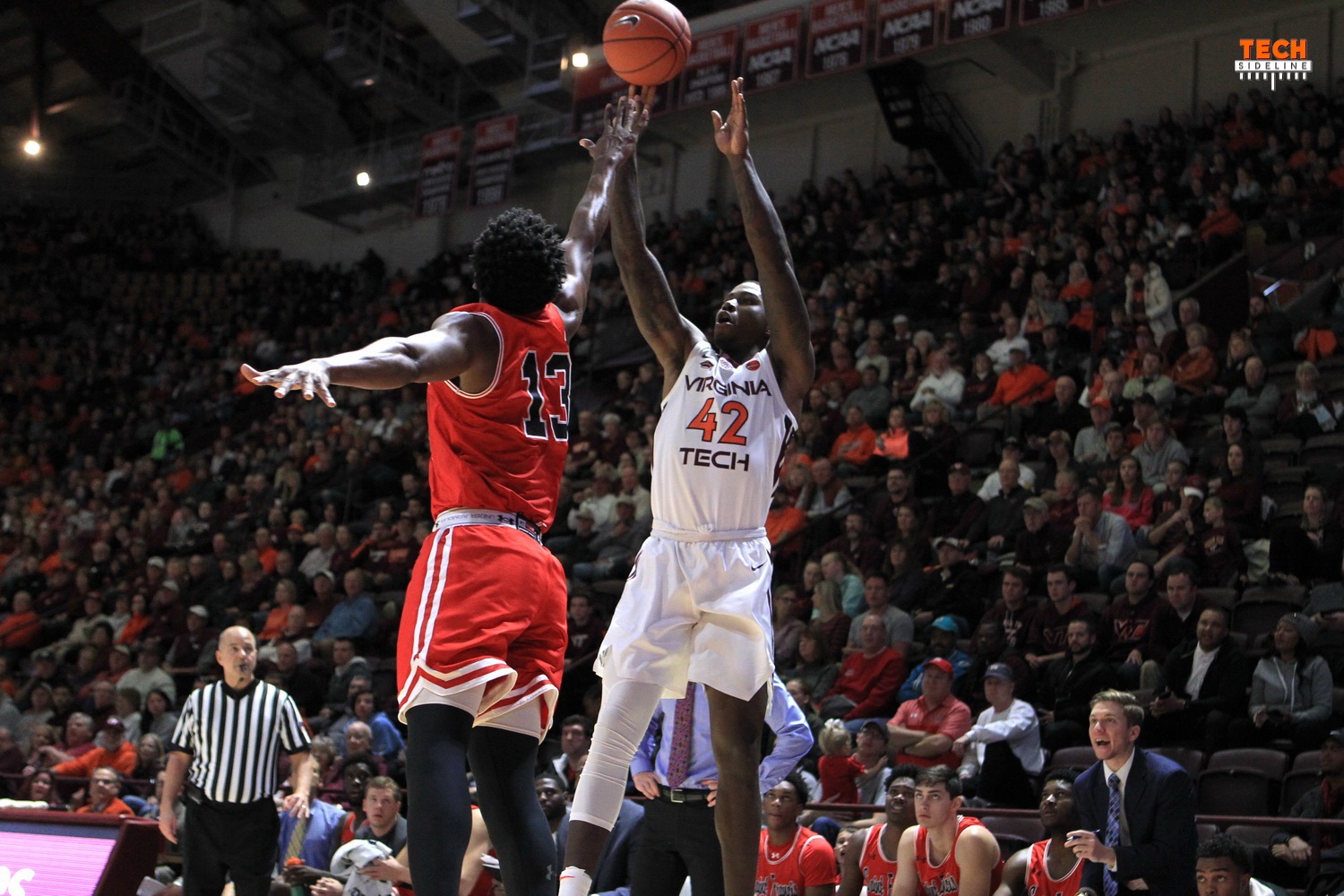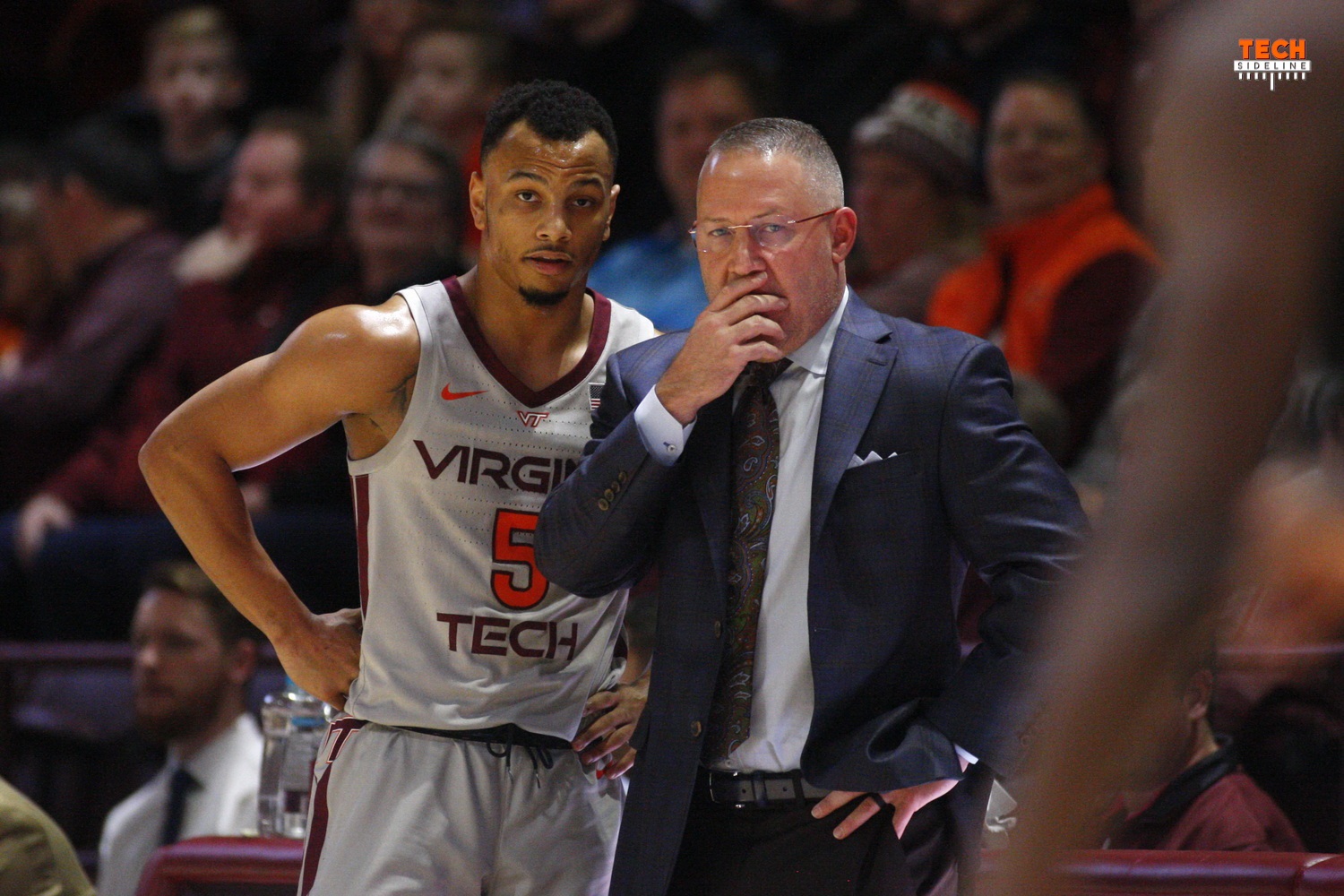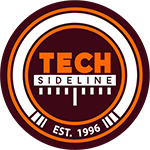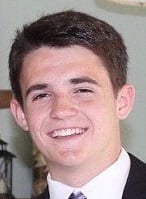
Ty Outlaw and Buzz Williams were Monday’s guests on Tech Talk Live, and they both had a lot to say.
Ty Outlaw
On his comeback over the last few years…
First, the experience has been humbling. I wasn’t much of a conceited person or anything like that before, but it showed me that I’m human and I have to appreciate every day that I get to do this. Next, it’s just showed me what the love I have for this game is. After almost having it stripped away from me, you just appreciate it that much more once you’re back.
On how he got to Virginia Tech…
I started off as a freshman at UNC Greensboro. I had a great freshman year, but it wasn’t the right spot for me, so I took the junior college route. I went to a small town, Baytown, it’s near Houston, Texas. Nobody has ever heard of it. On our lowest attendance days at Cassell, it’s still three times bigger than the crowd we had. That was another humbling experience, and it made me realize how much I had to love the game and not the other stuff that can come with it.
I got recruited by Virginia Tech, you know Buzz [Williams] likes those JUCO guys. They felt like I was his kind of guy and could come fit in right away. I got some bad news once I got here because they were concerned about my heart for good safety measures. They put it in the perspective of as if I was one of their children, they would want someone to be extra careful before they cleared me to do anything. It took me a whole year to get that process done, they told me I couldn’t even sweat. I never really went three days without playing basketball, and then I went nine months.
After clearing that, I finally got a chance to play again and had an up and down type of year, ended on a good note once I really got going. I got more bad news over the summer [with a torn ACL in the summer of 2017]. You can’t really do anything about injuries, but after doing every rehab, I realized I would rather do rehab than sit out for nine months and not be able to sweat. I felt more in control. I felt like my effort put directly into my rehab will affect how I will be afterwards. When you have no right or no control to work out, you fate is in the hands of others. I don’t like that non-control situation. That really wasn’t that bad. I knew I could come back and play. I really just focused on that and now I’m here, so everything worked out.
On being a graduate student…
It’s very difficult to be a student-athlete with the hours that we put in for basketball and traveling. Sometimes, you just don’t feel like going to class, but if you don’t go to class, you don’t learn the material and it is hard to pass an exam. You have to make a lot of mature choices to get your work done and go to class in order to pass those classes and still be a student-athlete.
When you can earn a degree and work on a second one, and still not let that falter with your sport activities, you want to take pride in that because not everybody can do it. I know guys do it every semester, every year, but they don’t realize how much our coaches explain to us how important it is. We’re not doing it just because, we have our reasons. It’s something to be proud of. We make our coaches proud as well because they want to be representing an educated, young body of males.
On his role going forward…
Sitting out twice really helped me view what my role would be without Coach [Williams] needing to tell me at all. I realize they need me to make open shots. I need to be a strong defender, I don’t need to be causing problems on defense and being a liability, and rebounding. We always struggle with the rebounding battle and I feel like I can help us. I have helped us. It’s just a matter of keeping it going.
That’s really a simplified version of what my role is on the team, and I’m just trying to stay within that. Wherever I can get some extra stuff in, I’m going to do that. Hustle plays, playing hard, staying emotionally stable, keeping my teammates calm, speaking out sometimes, calling people out, holding myself accountable and others, that’s stuff I’m not afraid to do. Every time I go out there I’m trying to give 100%, so I have no problem doing that to other people.
On what the team learned from the Penn State loss…
We realized that, one, how important it is to rebound late in games, but we had plenty of chances to win that game and we just realized that we aren’t invulnerable. On the road, it takes more than just being prepared and playing hard to win. We talk about attempting and executing. We attempted to play hard and we attempted to win at Penn State, but we didn’t execute when execution needed to be done. We learned we needed to execute better in those clutch situations. Especially having the mature team that we have, we should be able to do that.
On what he will do after basketball…
Where I come from, not many children get the opportunities that I have had. I thank my support system a lot for that, including my family and those outside of my family. I want to be that support system for somebody else. I want to help troubled and non-troubled youth, to get them from that high school step to the further education step, or if it’s a job, just getting them on the right path, because I’ve seen so many people slide off the deep end.
I also want to coach at the high school level. The college level is too much for me, too stressful, but I’d like to get them to the college level basketball-wise and education-wise. I want to use both to change the lives of younger people.

Buzz Williams
On Ty Outlaw…
He’s my hero. His mom may be the best parent I have ever seen of a single parent. Ty is everything you want in a student athlete. We’ll miss him as much or more than anybody who has been in our program. When you say something, he does it, no matter what it is you say, and you never have to go back and follow up, ‘Hey, did you do this?’ When you say it, he does it. If he doesn’t do it, he’ll tell you he didn’t do it. That’s on the court, that’s in practice, that’s in the weight room, that’s in the training room, that’s in study hall, that’s in his classwork.
I couldn’t tell you anything that Ty has done since his first semester academically because he told me, ‘Coach, you never have to talk to me about this.’ I never have to talk to him again. He’s as mature as any player that I have ever coached. I think he has taken the next step that leaders take in regard to understanding that not only does he know what is right, he’s using his influence to help others. That has really made an impact on our team. We’ve practiced 35 times so far this season, and I would say seven times his voice has been heard. It’s something that I would have said, but because he said it, it has more of an impact. I think that number will double over the next 35 practices just because he feels more comfortable.
Because I can coach him any way I want to coach him, and he responds, that example is very influential to our freshmen because they don’t know that, but over time they begin to see that. He has been a mainstay in our program, even though he has played the least number of games of anybody that has been on scholarship over the last four years, but it’s hard to argue the impact that he has had in the games that he has played.
On when he knew Outlaw was right for the program…
[I knew he was our kind of guy] when he came on his official visit. I talked to the grouping of junior college players that were here that weekend. When I walked out, I said to our staff, ‘I want to sign him.’ I was pointing at Ty. He never blinked. I thought he was the best junior college perimeter player in the country that year and he could have gone anywhere in the country. I wanted to sign him not just because of his skill, but I thought he was a man.
We should have, in hindsight, we should have signed more junior college players in the time that I have been here. A part of the reason we haven’t is because of Ty’s story. I don’t want a team full of junior college guys, but Ty has been a junior college player who has been on scholarship for four years. That has never happened in the history of the world.
We’ve had a lot of success everywhere I have been with one or two junior college players because of all of the things I said in answering the last question. They’re thankful, they’re grateful. When nobody is at the game, it’s still ten times more than anybody who was at the game. When you give them t-shirts, they’re thankful for all ten of them and they don’t give them to their girls. They’re proud of them because they understand that this is not the way it is everywhere. I’ve gotten away from that a little bit.
I think the further I have gotten away from that, the softer I have become as a coach, because I was one of those guys. I wasn’t a player, but the junior college Ty went to is in the same conference as the junior college that I attended. It’s the same conference that Joe Fulce, he’s on our staff, played in. It’s the same conference that Jimmy Butler played in. All of those coaches down there have known me since I was a teenager, including Ty’s coach. I think we’ve gotten away from that. In some ways, maybe it is viewed as a good thing, but in regard to how I operate and how I coach, it’s good to have some grown, tough, “we’re thankful for the shoelaces in our shoes” kind of guys.
On emotional intelligence, or EQ…
One of the things, as I’ve gotten older, that I don’t like about teachers, I don’t like about coaches, I don’t like about people in authoritative positions, is that they always seem to have the answers and so much of what comes out of their mouth is not to help, it’s talking down and never trying to teach. One of the things I hear coaches say a lot is, we need more leaders. I agree, not basketball-specific, but I think in the world, we need more leaders. They say it in such a way that it’s as if the people that they’re wanting to become leaders have an idea of how to do that.
I’ve tried to, this year in several different situations, act as if I’m the kid and I have no idea what being a leader is and trying to stair-step some level of foundation that is healthy for their life. When I was a kid, your IQ had a lot to do with your ability to have success. I think that the generation of my children now, they’re IQs are all very similar and it’s all much higher than people from my generation. I think that the separator from a success standpoint in that generation will be their emotional intelligence. It will not be their IQ, it will be their EQ.
I approached this subject with our guys, and I’ve studied this for several years and I’m not saying I have the answers by any stretch, but you can never become a leader if you’re not self-aware. Part of being self-aware is having a high EQ, or at least having some level of EQ. We approached the subject, and I think if you look at our roster and the complexion of our roster, we have a lot of kids who have a high IQ. I think that is good, they should be commended for it, but to think that that will be enough to be successful in the world they’re going to compete in, I’ll be old by then and it won’t matter, but having a high IQ will not be enough.
If you’re 15 years old and you’re thinking that you’ve got it figured out because you’re smart, those are the guys that you’re going to beat. I’ve tried to help them figure that out, guys like Ty have picked it up right away. They’re inquisitive by nature, smart people are inquisitive, they want to learn. We have found situations since I have talked about it where they understand. We did some things to get reps of learning how to have a better EQ. If our team is going to have a chance, we’re going to have to have a higher EQ. I don’t think we have a low one, but we need to have a much higher one.
On what they have done to improve EQ…
In general, everything. The day I taught it, I was a jerk the whole time on purpose because just talking about something doesn’t raise your EQ. Just because, ‘Hey, I’m going to study this, I’m going to memorize it, I’m going to take this test, and taking this test means I’m going to have a high IQ because I can memorize something,’ doesn’t prove IQ.
EQ, recognizing, understanding, and managing your emotions. Everybody understands that as you say it. It also influences the group you’re with, if you’re talking about a group EQ. You can’t do that when everything is fine. Your EQ can increase or decrease when you’re under duress, when your team is under duress. The next day, I completely flip-flopped everything we have ever done in practice, almost like I was a schizophrenic in our practice itinerary. Just there they go and as soon as they get going, I say, ‘No, we’re going to do this.’ Then they would have to do this.
It’s the same thing that we talked about during the game, during the ATOs. That is where we failed, that’s why I decided to bring it to our attention. Our EQ failed on Saturday versus VMI because they knew we were going to win. We’re up 21 at half, we start the second half 14-0, now it’s a 35-point game. Then, it just kind of goes away because of their IQ, they’re smart kids. They’re like, ‘Buzz, we’re going to win this game.’ Yeah, but we’re going to give away the reps of understanding and having the maturity of understanding the value of those reps.
That is the value of having a high EQ. We were much better [against South Carolina State]. I think they scored less points on Sunday in the second half than they did in the first half. I also believe this, all of the shots that Ty missed, he didn’t miss many, the shots that KJ [Blackshear] missed in the first half, the shots that Med [Ahmed Hill] missed in the first half, those are the shots we always take that we want them to take. Their EQ and how they handled that was as good as it has been all year. Not just those kids, but collectively our team, and our team was talking about that during timeouts. Now, the neutral site game against Washington will be a great rep for us.
On how Kerry Blackshear has taken a step forward as a leader…
I think that we talked about it in postgame. I think the emotional intelligence piece is the next step for KJ relative to his life. KJ is incredibly intelligent, he’s graduating next week. Potentially, we’ll have four guys starting that all have graduated. KJ has to improve, as do we all, in his EQ. I think some of the things that we have talked with him about during his career here, but specifically this year, is really focusing on trying to improve, trying to understand how he can influence our team for the better. When his spirit is in the right zone, he has distinct influence on our team.
I’ve been studying this type of stuff for a long time, and I think it impacts all of us. It has nothing to do with coaching, it has nothing to do with ball, it just has to do with how we are wired. It’s not emotional intelligence that I am talking about now, but we all have twenty-ish neurotransmitters in our brain, but four of them dominate the work. In accordance with how we were created and how we are wired, those neurotransmitters are what dictate not only our personality, but how we think and how we process information. We brought a guy in early this fall to teach it to our staff and teach it to our team.
I knew all of this stuff because I’ve been studying this for a long time, so they used me as a guinea pig, not only with the staff, but also with our team. Ty and I are very similar, that’s part of the reason we get along. Ty was not the kid when he played baseball that was messing around in the dirt and acting like a little kid. He was the kid that was looking at the kid playing in the dirt and wondering, ‘What’s wrong with him?’ Part of that is that’s how his mom raised him. You’re going to do right. You’re going to do right all the time. You’re going to do right whether I’m standing next to you or I’m at work. Ty and I are wired very similar.
KJ is, if I live in Blacksburg, he lives on Mars, relative to how he is wired. Understanding KJ having an opportunity to hear someone break down me was very helpful for him. That same person breaking down KJ was very revealing to him, and it helped all of us, not just KJ, Buzz, or Ty, it helped all of us to better understand one another. I think the next layer to that is having a high EQ.
When I talked to Ty on his recruiting visit, and he never blinked and his shoulders never slumped, I knew how he was wired. It didn’t have to do with, he’s going to have the best three-point field goal percentage in the country four years later, it wasn’t that. It was, would he ever have enough guts to shoot a three because of what he’s going to go through every day. What he goes through every day with us, he doesn’t think it’s hard, tough, or a lot of work, he’s just like, ‘This is what we’re supposed to do.’ He’s very linear. ‘When we do this, we’re going to do this.’ KJ is not like that, and I think that he has been so impressive in how he is trying to understand how he can influence us relative to his spirit. I think that also keeps him out of foul trouble, that’s just my opinion.
On PJ Horne’s personality…
It’s the same stuff. I could talk to you about every one of our guys. Obviously, the ones who are as articulate as Ty, it’s so much easier to understand. The ones that impact the game so much at both ends of the floor like KJ, it’s so easy to understand, and he’s just as articulate as Ty. If you talk to P.J., you need to ask direct questions that require an answer because he’ll just keep looking at you, but that doesn’t mean he doesn’t understand.
PJ hasn’t dropped a single class since he has been here. At the end of this semester, he’s going to be about 15-18% of where he should be ahead relative to his degree. We do need PJ to be, ‘Mean P.J.’ as I call him because normal P.J. will not be good enough for it to be a push. We need him to be ‘Mean P.J.’ in hopes that maybe at his position, defending his position, rebounding his position, maybe he can a point better, a rebound better, that he’s not a liability.
I think in many respects over the last couple of weeks, he has made some steps. This game upcoming is a challenge for him because it is going to be zone every possession, make or miss. If you tell Ty it’s zone, he’ll say, ‘Buzz, I’ll be standing right over there, is that right?’ Yeah, that’s right, just stand right there, but if you tell PJ it’s zone, he says, ‘How am I going to impact the game?’
If PJ can continue to take the same steps that he has been taking, the same steps that KJ has been taking, it will eventually come to, ‘Can we all be our best version of ourselves together at the same time?’ When you look at our league and how many elite level teams there are, how thin the margin is going to be for us, that’s what we’ll have to crescendo to. I hope that through three games this month, I hope that we’re trending in the right direction. I thought that we started really good winning the tournament, I don’t know when the last time they did that at Virginia Tech, but since I’ve been here we’ve never played for a championship.
I hate that we lost by one to a team that I think is going to be okay at best in the Big Ten, but if we can use those lessons and it prevents us from having to learn those lessons in late January, then okay. It’s worth it as long as when we get to late January, we don’t have to not only learn that lesson, but since we learned it in late November, we’re so far down the road from that specific lesson. I don’t know if that answers your question, but we need PJ to be mean, and I don’t always use the word mean.
On how the Washington matchup has changed since the Hokies faced them last year…
I think they’re better. I think they’re older. I think they’re another year more comfortable in their new system. Last year it was Coach Hopkins’ first year. For the most part, he coached the team that was there, a very talented team. I think they got beat in the second round of the NIT. They have very good pieces that I haven’t started studying on purpose. I did not start today, I’ll start tomorrow. I think that they have improved relative to their game individually, and I think they’re much more comfortable in how they play the zone.
One thing that doesn’t go mentioned enough in a team that plays zone all the time is relative to how you are attacking the zone is how they will contour the zone based on that attack. When I can I borrow Coach Foster with his defensive prowess on ‘If this, then that.’ Of course, it is a kindergarten question from me to him, but I’m always trying to figure out if they were doing this, you would do that. It’s the same thing. I think we’ve played Syracuse so many times, that they have a really good idea of how we’re going to attack it. As soon as you begin to attack it with your first line of offense, then they begin to counter with, ‘We know that is what you’re going to do, now we’re going to do this.’
I think that you can only do that when you’re a new coach in a new system. If we have forty plays that we can run against a man, there’s only seven you can run against a zone. Those seven plays are the same seven plays that every other coach in the country runs against a zone. That’s the math of why you play zone, that even specific to your attack behind those plays, the zone is going to counter based on what your plan is.
I think they’re better, and I’ve visited with our guys a little bit today, our staff, ‘What about this, what about that?’ They give me a cheat sheet when I start an opponent. This is the last time of the year that we’ll have a one-week prep. It’s a weird week because of finals, because of when we practice, and that is why I was visiting with the staff. We were off today, what can we do tomorrow, same thing on Wednesday. Then we’ll be back to normal on Thursday and leave on Friday.
They’re a top fifty team, we’re a top fifty team, so this will be a good matchup for us. This will be our fourth neutral site game of the year. We were scheduled to play Kentucky in the Garden on Saturday, but they cancelled the contract. That’s why we have the game that we have. This is the last game that we scheduled, very thankful that it worked out. It’s ironic that it would be Washington, who we played very early last season.
Virginia Tech has held the Commonwealth Cup for 5126 days. #Hokies
— Commonwealth Cup (@CommonwlthCup) December 10, 2018





 Print
Print







One of the few coach interviews where I read every single word. Thanks. A.H.
Me too. I was fascinated listening to Buzz. He operates at a whole different level.
I think Buzz has the Tiger (life) by the tail!
Great deep thinking coach wanting to make boys into men to be proud of…
Christian spirited/faithed and willing to do a LOT for others…
Willing to experiment and learn continuously – it might be his way or the highway…but the highway keeps getting build and DOES NOT run in circles
Glad you are with the Hokies Buzz – keep the train rollin!
GO HOKIES!
I would love to be his shadow for a day to watch and listen to his interaction with his coaches and players. Would be amazing!
I’m a fan of EQ and Buzz is spot on with learning the ins and outs of his players and
how to relate to them. Teaching them some self awareness will make them better Ball players,
better teammates, and better members of society. Hopeful that translates to success for all of them.
Buzz has always been unique! I don’t have any male offspring but if I did I would be proud to have Buzz as their coach.
Funny, a lot of people who talk a lot never have much to say, but Coach will keep you on the edge of your seat with yours ears tilted forward!
Good article/interview. Ty demonstrates a lot of maturity in his comments.
Exactly, haven’t heard him speak before but his comments were pretty impressive.
Buzz is like the little guy that hangs around the gym all the time, is usually the last one picked, but ends up knowing more basketball than anybody else.
He’s an interesting guy to be sure, and this is what he is about, sorta like he’s a mad scientist trying to understand the secrets of life. Sure, he’s a coach and wants good players and to figure out ways to make them better but as he said he’s probably not going to get the McDonalds all-Americans, but I’d turn that around and suggest that he doesn’t want the those guys either, what’s the point of having a guy who’ll only be there/here one year and probably isn’t really interested in listening to a coach past the first level of coaching? That doesn’t interest him even if it means no NCAA championship.
So for those who worry about Buzz leaving for a “better” program in the conventional sense, I would say, don’t worry he’s more interested in running his experiments and trying stuff like he is here, it might be something else, but it won’t be the money.
I would bet you a few bucks that Buzz would be quite happy to have Duke’s freshman class this year..or any other year for that matter. I get what you’re saying about one-and-done not really being his “thing”, but winning and winning BIG is something he’d like to do. Not sure he wants to coach long enough to get to that status, but I have a real hard time believing that he wouldn’t be pretty darn happy if he had Zion Williamson, Cam Reddish, etc. wearing Orange and Maroon at the Cassell, and a couple Final Four’s and a National Title or two.
Wow! Great stuff in there. What a fantastic read.
Great read. Thanks for writing.